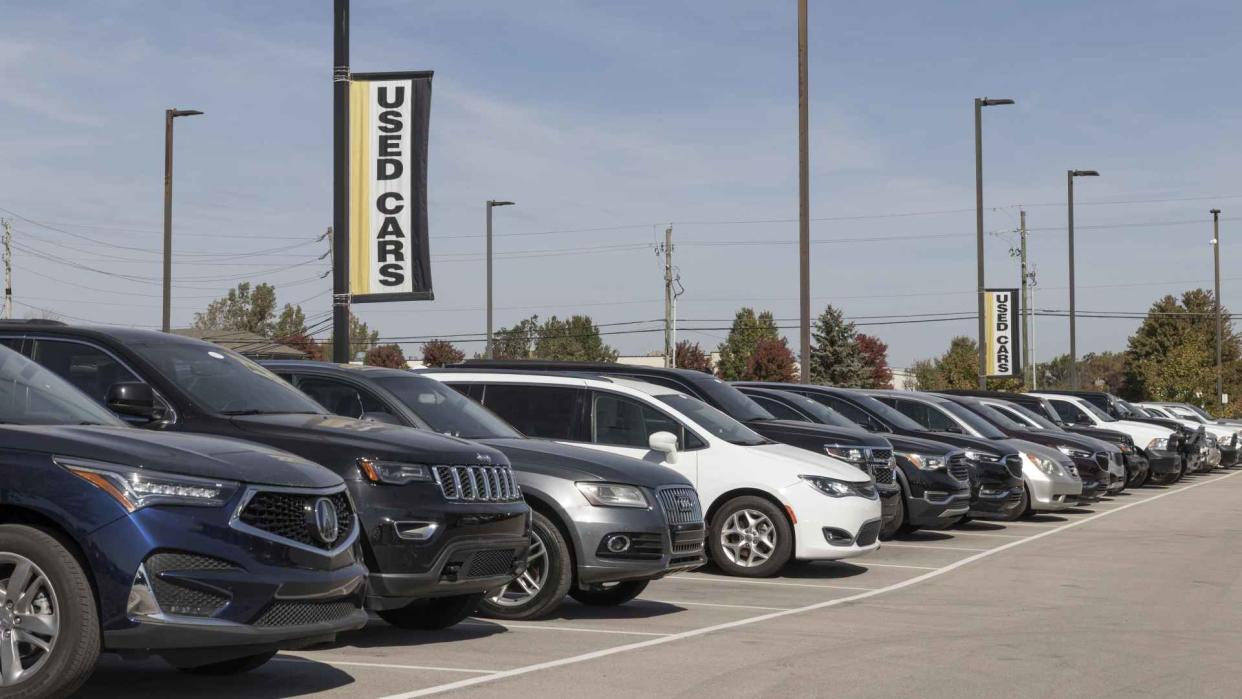7 Signs a New Car Will Be Hard To Sell in 5 Years, According to Experts

The sad truth is that when you buy a new car, the depreciation clock starts ticking the minute you leave the lot. In fact, according to Kelley Blue Book, the average car is only worth 42.4% of its original sticker price by year five. Fortunately, experts say there are ways to be on the right side of that stat.
Check Out: 9 Easy Ways To Grow Your Wealth in 2024
Discover More: These 10 Used Cars Will Last Longer Than an Average New Vehicle
There are obvious budget-friendly ways to protect the value of your car, like performing regular maintenance, keeping service records and limiting your mileage. But there are also high depreciation warning signs to look for when shopping for your new car.
Here are seven new car traits that experts say make a car more difficult to sell down the road.
Also here are other ideas to do with a used car.
It’s a Gas Guzzler
With electric vehicles becoming more popular (according to MarketWatch) and average gas prices topping $3.50 per gallon nationwide (according to AAA) — and over $5 in some states — internal combustion engine (ICE) cars and trucks with low fuel efficiency could be difficult to sell in the future, according to experts.
“Cars with poor gas mileage often depreciate faster, as fuel efficiency is a priority for buyers,” said Rob Dillan, founder of EVhype, an electric vehicle information site. “With rising fuel costs, a vehicle that consumes more will be less attractive on the resale market.”
Read More: 4 Car Models That Will Have Massive Price Drops in October 2024
It Has a Bad Reputation for Reliability
If you’ve ever bought a used car, you know that reliability trumps just about everything else. The last thing you want is to buy the seller’s car problems. So, buying a new car with a great reliability reputation can go a long way toward ensuring the car’s resale value, assuming you keep up on regular maintenance.
“Makes with a reputation for breakdowns and repairs don’t hold value well,” said Gretchen Seidel, automotive expert at Seidel & Co. “It could mean that they’re unreliable as they get older, which puts off buyers who may be in the market for an older vehicle they consider dependable.”
It Lacks Modern Tech
The car you buy today won’t have the latest technology five years from now. So the best you can do, experts said, is to get the most up-to-date tech you can afford. That way, even if many of the features are updated, many will still hold some value.
“Pre-owned models with outdated technology disappoint as consumer expectations rise and [those models] depreciate faster with each new model release,” Seidel said.
It Has a High Maintenance Cost
With the costs of fuel, insurance, loan payments and the occasional repair, cars are already budget-busters. So, experts said, if a brand or model is notorious for having high maintenance costs, it can make offloading it that much more difficult in the future.
“Some luxury or performance models have expensive upkeep that hurts resale,” said John Lin, co-founder of JB Motor Works in Philadelphia.
It Has a Poor Safety Rating
Safety is often a prime consideration for those buying a used vehicle, especially for families with kids, Lin said. Brands and models with modern safety technology and high crash test scores retain their resale value better than those without, he added.
Dillan said to look for modern safety features and digital enhancements such as advanced driver assistance systems (ADAS), which use cameras, sensors and software to give drivers safety information.
It’s a Discontinued Model
It might be difficult to know if the model of a car you’re buying will be around in five years. If possible, though, try to avoid models that have been or will be discontinued, according to experts.
“Cars that are no longer in production can be a red flag for buyers due to potential difficulties in finding parts and service, potentially lowering their resale value,” Dillan said.
So, if you’re concerned about resale value, it might be wise to stick to tried and true models that have been around for years or decades.
It’s an Overproduced Model
Paradoxically, extremely popular models that have huge production runs can actually hurt resale value down the road, experts said.
“When pre-owned vehicles flood the market, for example, on leases after three [or five] years, competition gets fierce, pushing prices down,” Seidel said. “Potential buyers get spoiled with all the choices, which drives the prices even lower.”
More From GOBankingRates
9 Moves For Building Lasting Wealth: What Smart Americans Are Doing Right
7 Best New Items To Buy at Dollar Tree Ahead of Halloween 2024
The Average Consumer Has $6,329 in Credit Card Debt. Here's One Smart Way to Get Out
This article originally appeared on GOBankingRates.com: 7 Signs a New Car Will Be Hard To Sell in 5 Years, According to Experts
